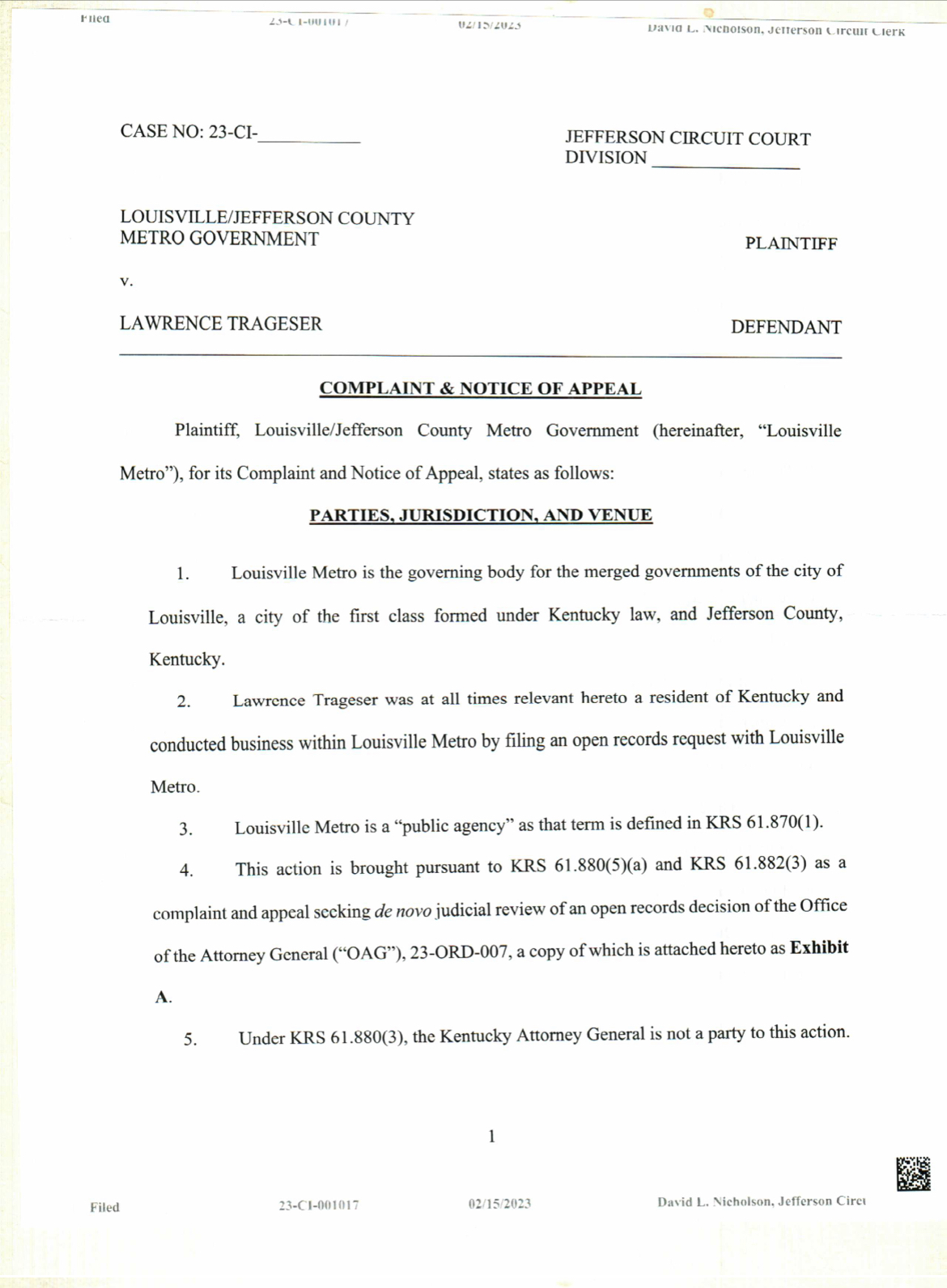

Louisville Metro has filed suit against "Spencer County Watchdog" Lawrence Trageser, challenging a Kentucky Attorney General's open records decision in Trageser's favor.
This time, the Kentucky Open Government Coalition comes down firmly on the Attorney General's (and Trageser's) side.
Louisville Metro objects to the current Attorney General's interpretation of an open records regulation, 40 KAR 1:030(6), which states, "If the requested documents are made available to the complaining party after a complaint is made, the Attorney General shall decline to issue a decision in the matter."
https://apps.legislature.ky.gov/law/kar/titles/040/001/030/
Promulgated in 1995, the regulation was intended to summarily terminate open records appeals in which the requester's dispute with the agency was resolved, after the requester appealed, by the release of all requested documents.
Unfortunately, it has in many instance resulted in past attorneys general “rewarding” agencies for open records noncompliance -- certainly not the regulation's intent
but it's net effect.
Some agencies ignore records requests, hedging their bets that the requester will be discouraged and capitulate. The current Attorney General has determined that Louisville Metro is a regular offender of the five day statutory deadline for final response to a records request.
In its Jefferson Circuit Court complaint, Louisville Metro asks the Court to “review of an open records decision of the Office of the Attorney General 23-ORD-007,” a dispute involving Louisville Metro’s failure to respond to Trageser’s request for the “personnel file of a former Louisville Metro employee.”
In resolving the appeal against Louisville Metro, the Attorney General reasoned:
“Trageser claims to have submitted a request on December 3, but has never received a response. Metro carries the burden of justifying its actions, KRS 61.880(2)(c), but has not disputed Trageser’s claim or otherwise explained why it failed to respond to the request within five business days.
“Thus, Metro violated the Act when it failed to respond to the Appellant’s request within five business days.”
https://www.ag.ky.gov/Resources/orom/2023-OROM/2023/23-ORD-007.pdf
Louisville Metro argues that the Attorney General:
“has consistently applied 40 KAR 1:030 Section 6 and declined to issue a decision once records have been provided to the requestor. See 22-ORD-180; 22-ORD-172;
see also 22-ORD-274 fn. 2.
“Here, the requested documents were made available to the complaining party, Mr.
Trageser, after he made a complaint, thus the OAG is required to decline to issue a decision in
the matter.
“Because the OAG failed to decline to issue a decision as required by Kentucky law,
23-ORD-007 should be reversed and this Court should find Louisville
Metro did not violate the Open Records Act because the issue was required to be moot.”
The target of Louisville Metro’s animus is Louisville Metro, not Trageser. But the Attorney General cannot be “named as a party in any Circuit Court actions regarding the enforcement of KRS 61.870 to 61.884, nor shall he or she have any duty to defend his or her decision in Circuit Court or any subsequent proceedings.”
https://apps.legislature.ky.gov/law/statutes/statute.aspx?id=51394
While past policy reversals in the Attorney General’s Office have, with the courts’ approval, been accompanied by an explanation, we believe recent amendments to the open records law support the policy change.
(Commonwealth v Chestnut (2008): “We agree with the DOC that the Attorney General had an obligation to explain why his decision in Chestnut's case was at variance with his prior opinions. But the Attorney General's opinion contains an analysis, centering upon his decision in the case involving school employees' personnel files, of why he chose to depart from his earlier precedent regarding the specificity requirement for inmate open records requests.“)
https://caselaw.findlaw.com/ky-supreme-court/1387319.html
In 2021, KRS 61.880(4) — which deals with a subversion of the intent of the open records law, short of denial of inspection, that authorizes an appeal to the Attorney General was amended. It was expanded to include “delay past the five (5) day period described in subsection (1) of this section, [and] excessive extensions of time.”
This imports a legislative resolve to rigorously enforce the five working day deadline for final agency response and justifies a change in position where a request is not denied but ignored.
https://apps.legislature.ky.gov/law/statutes/statute.aspx?id=51394
This, coupled with a long history of agency abuse of the statutory deadlines, as well as the “rewarding” of this conduct by more or less strict enforcement of 40 KAR 1:030(6), constitutes the basis for our endorsement of the Attorney General’s interpretation of the regulation.
We are hopeful that the circuit court will agree with the Attorney General’s (and our) view.


